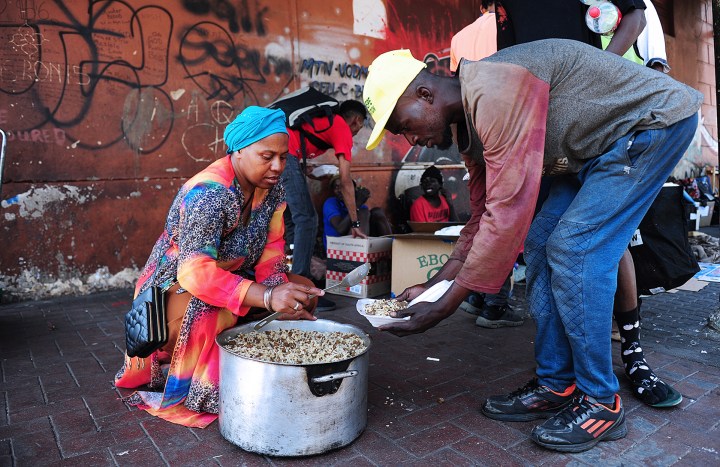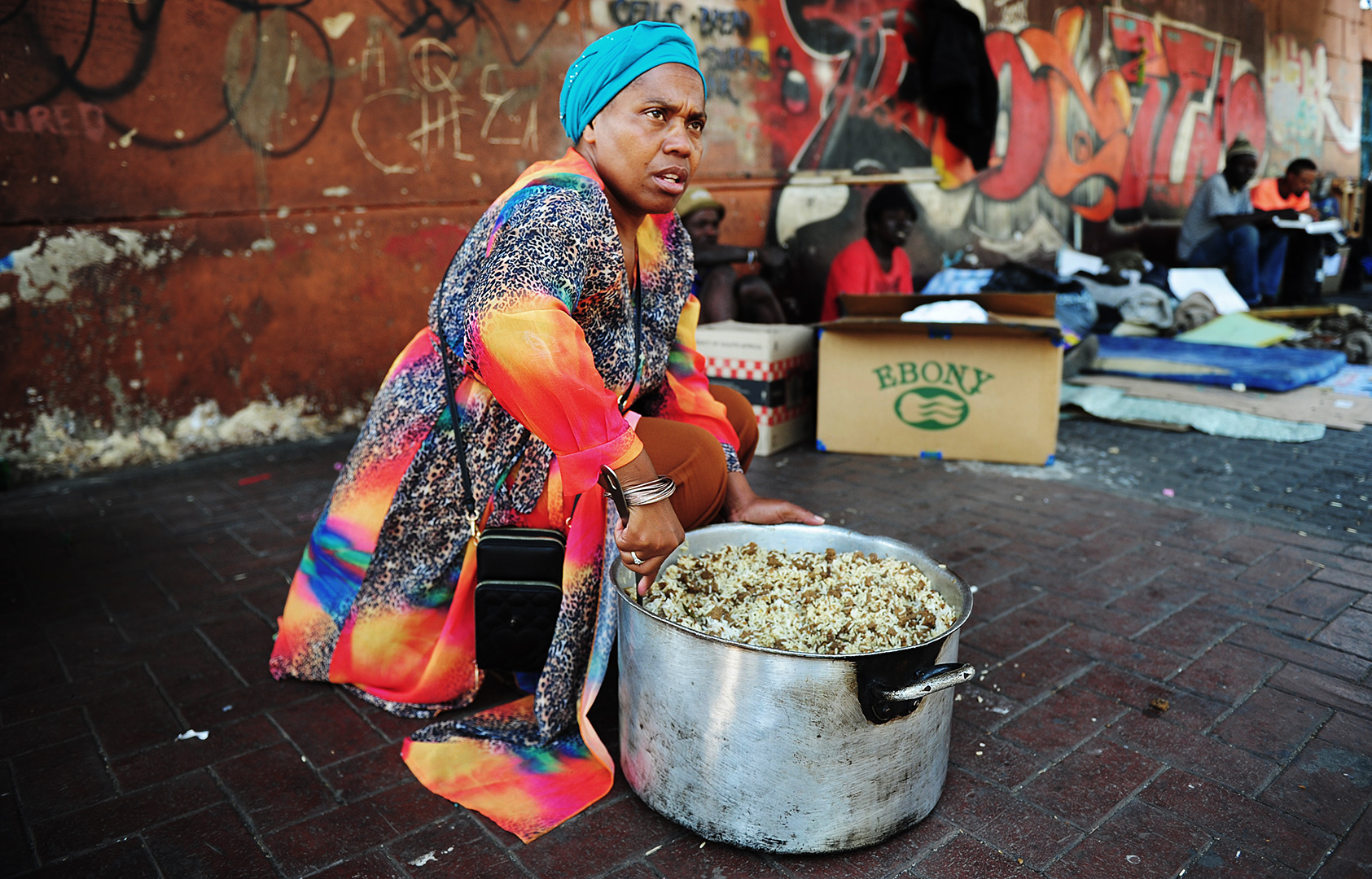
SPIRIT OF THE GREAT HEART
Joburg’s Good Samaritans say feeding the homeless becomes harder as resources dry up and food prices soar

Women who help feed the homeless in Johannesburg are having to scale back on their charitable work as the need for assistance increases and the price of food rises.
Moejira Atibu (41) says food prices are so high now that she is able to cook and serve food for homeless people only twice a week, while at the peak of the lockdown she was able to do so daily.
“Sometimes I don’t dish up for two weeks because there is no food to serve people, but they understand and are just happy when I manage to help,” said Atibu while mixing cooked rice and mince in a huge pot.
Atibu saves money from her hairdressing work and has six family members who regularly help to assist hungry homeless people in Vrededorp, Johannesburg. She cooks in her mother’s kitchen and her young sons help carry the big pot two blocks away where she serves homeless people and street vendors.
“I don’t have an organisation, I just cook in my house and anyone who needs food in my street comes around. The past two years have been difficult. It’s not only homeless people who are going hungry, sometimes people in homes come as a family to get a plate. When I see a child I ask for their parent and take note of where they live so I can take the food to them or let them know so they don’t miss the servings,” said Atibu.
Vrededorp resident Siyabonga Shabangu (34) said Atibu is a beacon of hope and reminds him that he is valuable.
“I met Ma [Atibu] three years ago when she opened a soccer team for us to play but that needed money and died out, so she helps us with food and whatever else we need — getting medication, documentation and so on. Four people have died here on this street because of hunger and not being able to take medication, all in the past two years,” said Shabangu.
It is estimated that 11% (6.5 million) of South Africa’s population are hungry and food insecure. The Johannesburg Homelessness Network estimates there are about 20,000 homeless people in Johannesburg alone, and the need for soup kitchens and other assistance is significant.

Moejira Atibu started feeding the homeless during the Covid-19 lockdown in 2019. (Photo: Leon Sadiki)

Moejira Atibu (left) and her sister Elizabeth Valentine serve the homeless with food. (Photo: Leon Sadiki)

Moejira Atibu (centre) dishes up for the homeless on the side of the road in Vrededorp, Johannesburg. (Photo: Leon Sadiki)
Visit Daily Maverick’s home page for more news, analysis and investigations
‘January is particularly tough’
Cleopatra Buthelezi (50), who serves supper for the homeless in Joburg’s Inner City, said January had been particularly tough, as most donors were yet to come back or process proposals to help her provide food for the homeless. She used to provide supper daily, but can now do so only three times a week.
“I don’t have a registered organisation. I work with everyone passionate about helping vulnerable people in the inner city. It’s tough since most donors are still on holiday and most people who support the kind of work I do … from January to March, their focus will be on single parents and widowers, assisting them to take their kids back to school.”
Read more in Daily Maverick: Humanitarian organisations and feeding schemes struggle to stay afloat as costs escalate

Moejira Atibu shares a laugh with Siyabonga Shabangu, who is one of many that depend on Atibu’s kitchen for food. (Photo: Leon Sadiki)
“Most vulnerable people struggle with food, clothes, medication, and basic commodities like toiletries. Some donors promise and they don’t fulfil their promises. Some come to take pictures of the work I do … they promise to bring the funding afterwards — they don’t show up once they get something,” Buthelezi said.
She serves porridge in the morning for people on chronic medication. The meals she serves are usually pap or rice with vegetables or amasi (a fermented milk product), and soup with bread or beans. She prepares her meals in her kitchen and provides fruit with most meals.
The Household Affordability Index by the Pietermaritzburg Economic Justice & Dignity group (PMBEJD) revealed that food prices in South Africa shot up significantly in December 2022, when a basket of goods cost 13.5% more than the previous year.
For December 2022, the group’s basket of nutritional foods came to R4,853.18, up R577.24 from R4,275.94 in December 2021.
Buthelezi said challenges with donors ranged from empty promises to terms and conditions which excluded certain groups.
“I help any vulnerable groups, some after hearing that I help migrants and locals just disappear into thin air. Others even give specifications on who to help with their donations and who not to assist. But for me, it’s not about where you come from, it’s about the fact that you are vulnerable.”
Buthelezi is passionate about helping people living on the streets retain their dignity. She helps them to access their medication and facilitates counselling with organisations that provide it.
About 3 million people lost their jobs in 2020 and were added to South Africa’s growing unemployment figures. In a 2020 study conducted by Ipsos on behalf of the Centre for Social Development in Africa, it was found that almost half (46%) of adult South Africans agreed with the statement: “Adults and children in my household often had to go hungry during the Covid-19 pandemic, as we did not have enough money for food.”
This echoes the sentiments of people who run soup kitchens and provide other basic necessities.
Emily Wellman from the Norwood, Orange Grove and Houghton Community Action Network (Noah CAN), says she doesn’t know how people will cope as their reserves have dried up.
“We can’t get even close to the scale that we did during lockdown … we have scaled back and are trying to do more verification [to help the most vulnerable],” said Wellman.
The need for these charitable spaces and people has grown and yet the resources are increasingly scant. DM/MC






















Comments - Please login in order to comment.